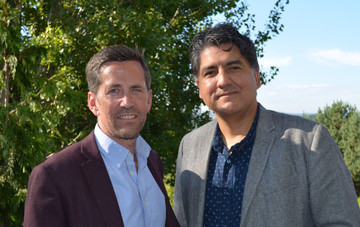 Jess Walter and Sherman Alexie Jess Walter and Sherman Alexie I was in my kitchen the first time I ever responded out loud to a podcast. “Exactly!” I said after author Sherman Alexie veered a conversation about football to the subject of military veterans. Sherman and his friend Jess Walter recently started the podcast “A Tiny Sense of Accomplishment.” The two men belong to the truly exclusive club of New York Times best-selling writers from Eastern Washington. I enjoy their audio mashups of thoughtful conversation and banter despite—or maybe because of—their occasional bursts of preteen humor. Halfway through that third episode, they interviewed Steve Almond, author of Against Football: A Fan’s Reluctant Manifesto. I began to feel unsettled. Though I'm not a football fan, I was relating to the conflicted tone of Almond’s voice as he described the many shadows cast by America's obsession with a dangerous sport. I stopped loading the dishwasher and listened intently. Then Sherman, whose Spokane Indian Reservation upbringing inspires much of his writing, commented almost without transition that Native Americans hold the military in high regard. That veterans are honored at powwows whether they served in combat or never saw a lick of action. That the warrior mystique is pretty ironic, considering “nobody has lost as completely, as totally and as easily as Native Americans.” Sherman had made the connection to a subject that’s even more complex than violent sport, one I’ve come to know a lot about. For the last three years I’ve been meeting veterans, delving into American history, and exploring military culture – all while sharing "Boocoo Dinky Dow: My short, crazy Vietnam War,” the Grady Myers memoir that I co-authored. Along the way, I’ve been exposed to heaps upon mountains of conflicted emotions. I meet many men who take great pride in having “done their duty” in a war that hurt them physically, mentally or both. It was a war they didn’t understand then and usually don’t approve in retrospect. It was a war so synonymous with moral and policy failure that the phrase “Another Vietnam” yields 143,000 Google results. I know combat vets who feel guilty for surviving and even non-veterans who feel guilty for having stayed out. I know veterans who speak enthusiastically of visiting ‘Nam as tourists and others who recoil at the idea. I’m grateful to the former war protesters I meet, glad they spoke out to end the carnage. I also understand the pain of veterans who felt disrespected by the protesters. As I explained in an essay about the “Boocoo Dinky Dow” journey, I’ve developed a deep connection with vets. I have military family. No way would I write a book called “Against Veterans” or “Against the Military.” Could I write “Against War”? Definitely. Though it would be a complicated book. Because in addition to horror and waste, war yields friendship, pride, and the occasional vanquishment of evil. War is a stage for both despicable crimes and crystalline acts of conscience. As Grady’s book shows, war can inspire art and even comedy. Jess carried the podcast ably to the finish line when he noted that stories of victory and defeat permeate our lives. Shoulder pads and flak jackets. Astroturf and rice paddies. Sure, they’re different. Except when they’re not. My thanks to the “Tiny Sense of Accomplishment” guys for stirring up these thoughts. It’s what the best writers do.
3 Comments
|
Julie Titone is co-author of the Grady Myers memoir "Boocoo Dinky Dow: My short, crazy Vietnam War." Grady was an M-60 machine gunner in The U.S. Army's Company C’s 2nd Platoon, 1st Battalion, 8th Regiment, 4th Infantry Division in late 1968 and early 1969. His Charlie Company comrades knew him as Hoss. Thoughts, comments? Send Julie an email. Archives
November 2018
|
 RSS Feed
RSS Feed